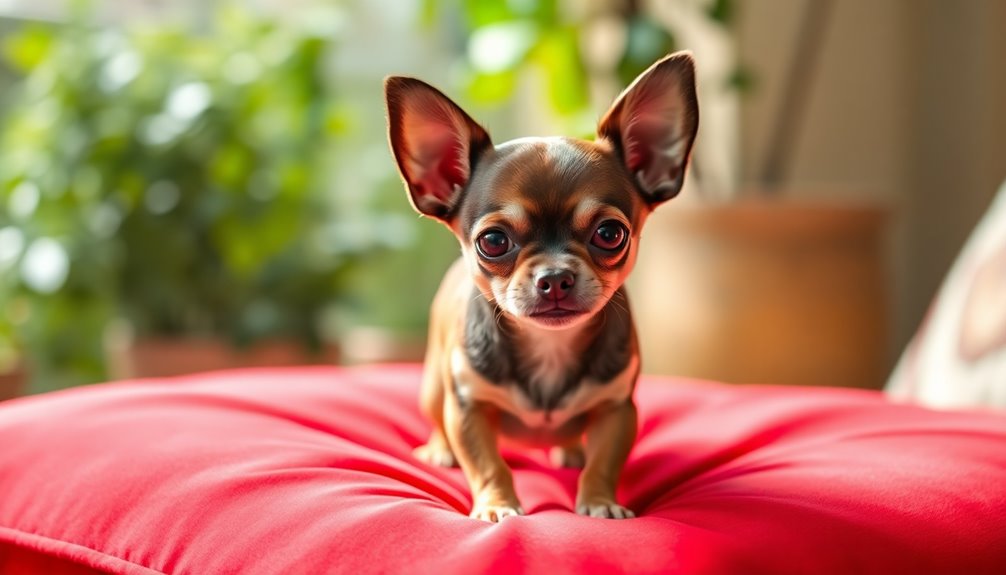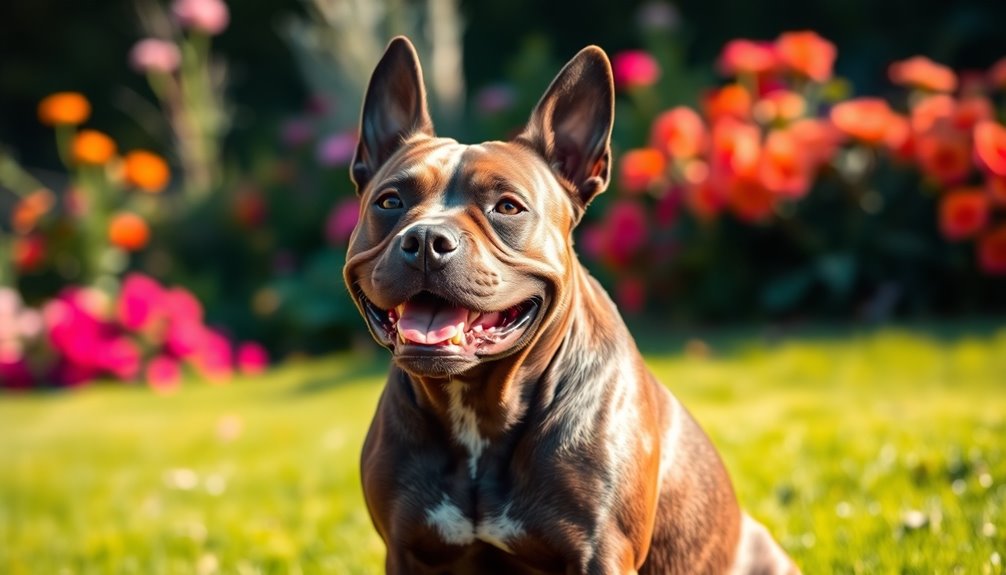Miniature Poodles are not just stylish; they're incredibly smart, making them ideal companions for various lifestyles. Standing at 28 to 38 cm tall, their curly, hypoallergenic coat comes in charming colors like apricot and silver. These friendly canines thrive in family settings and adapt well to apartment living. Their high intelligence means they learn quickly and enjoy mentally stimulating activities. Though they can face separation anxiety, regular exercise and socialization help keep them happy. You'll soon discover more about their history, training needs, and how to ensure they lead a long, healthy life.
Key Takeaways
- Miniature Poodles are highly intelligent and trainable, making them excellent companions for families and active individuals.
- Their stylish, curly coats are hypoallergenic, requiring regular grooming to maintain their appearance and prevent matting.
- With a friendly and outgoing temperament, Miniature Poodles thrive in social environments and are great with children and other pets.
- They require moderate exercise and mental stimulation, enjoying activities like brisk walks, playtime, and dog sports.
- Adaptable to various living situations, Miniature Poodles are ideal for apartment living, needing only a clutter-free space and daily outdoor activities.
Introduction
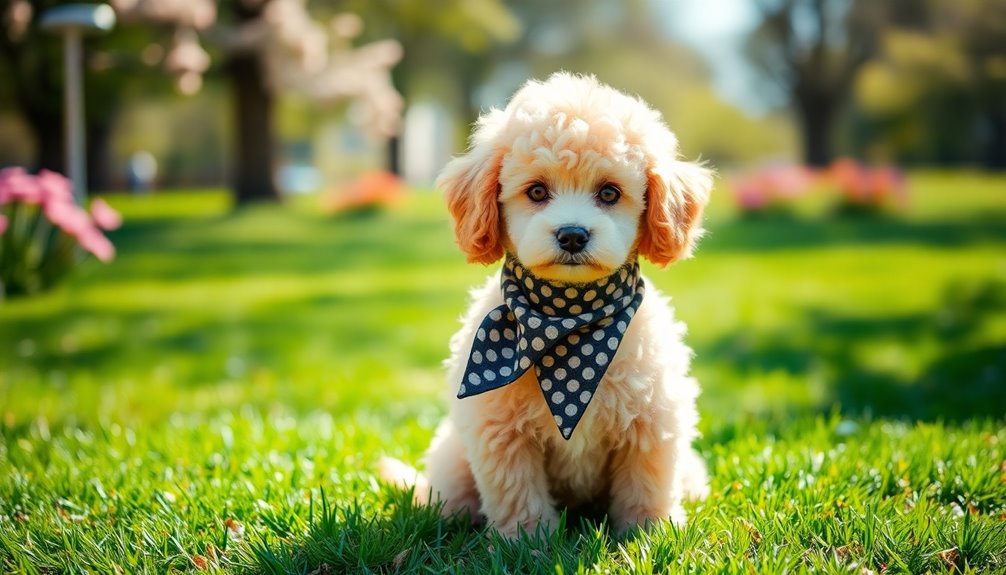
The Miniature Poodle is often considered one of the most charming and versatile dog breeds you can find. Standing between 28 to 38 cm tall and weighing between 6 to 12 kg, they're the perfect size for both apartments and homes. Their curly, hypoallergenic coat comes in a variety of solid colors, including black, white, apricot, and silver, allowing for a personalized touch.
You'll notice their distinctive facial haircuts and expressive eyes that can easily capture your heart.
These dogs are highly intelligent and quick learners, making training an enjoyable experience for both you and your Miniature Poodle. They've got a friendly and outgoing nature, which allows them to adapt well to various environments, getting along with children and other pets effortlessly. Additionally, their desire to please makes them highly motivated during training sessions.
Their playful demeanor thrives on human companionship, but be aware—they can develop separation anxiety if left alone for too long.
To keep your Miniature Poodle happy and healthy, they require moderate exercise and mental stimulation. Engaging in activities like obedience training or agility courses can help keep their minds sharp and spirits high.
Regular grooming is also essential to maintain their beautiful coat and overall well-being.
History and Origin

The Miniature Poodle traces its roots back to Germany over 400 years ago, where it was bred for water retrieval by duck hunters. You might be surprised to learn that these intelligent dogs later became stars in circus acts, showcasing their versatility and trainability. Understanding their history helps you appreciate the unique qualities that make Miniature Poodles so special today. Their high adaptability allows them to thrive in various living arrangements, making them a popular choice among families.
Where and when the breed originated
Although many people associate the Miniature Poodle with France, its origins trace back to Germany, where it was developed over 400 years ago. In the 15th century, the Standard Poodle emerged as the original breed, primarily bred for water retrieval and hunting tasks. Some experts even suggest that the breed's roots might extend to Central Europe, Russia, Spain, or Portugal, showcasing its diverse ancestry.
In the 1700s, breeders began creating smaller versions, resulting in the Miniature and Toy Poodles. These smaller counterparts gained popularity among European elites, who appreciated their intelligence and charming appearance. German soldiers are thought to have brought Poodles to France in the 1400s, contributing to the breed's strong association with the country. Notably, the Miniature Poodle is recognized for its high intelligence, ranking second in working and obedience intelligence among dog breeds.
The Miniature Poodle was officially recognized by the American Kennel Club in 1887 and is part of the Non-Sporting Group. Over time, selective breeding practices led to the development of distinct varieties while minimizing genetic issues.
Today, the Miniature Poodle stands as a symbol of elegance and intelligence, beloved by dog lovers around the world.
Water Retrieval and Circus Acts
When you think of Miniature Poodles, their remarkable history as water retrievers and circus performers often comes to mind. Originally bred to retrieve ducks and other birds, the name "Pudel" comes from the German word meaning "to splash in the water."
Their traditional grooming style was practical, designed to protect vital joints and organs while swimming. Hunters trimmed the legs, neck, and tail for efficiency, while leaving hair on joints for protection. Despite being primarily companion dogs today, some Poodles still assist in waterfowl hunting, reflecting their original purpose as water retrievers.
As their size decreased, Miniature Poodles found a new role in circus acts, particularly in France. Their high trainability made them perfect for performances that included walking tightropes, humor, and magic tricks.
This versatility not only showcased their intelligence but also helped popularize the breed beyond its hunting roots.
Today, Miniature Poodles excel in obedience training and can adapt to various roles, such as service and therapy dogs. Their exceptional noses even make them suitable for truffle hunting.
The blend of their historical roles in water retrieval and circus acts highlights their adaptability and intelligence, making them truly unique companions.
Physical Characteristics
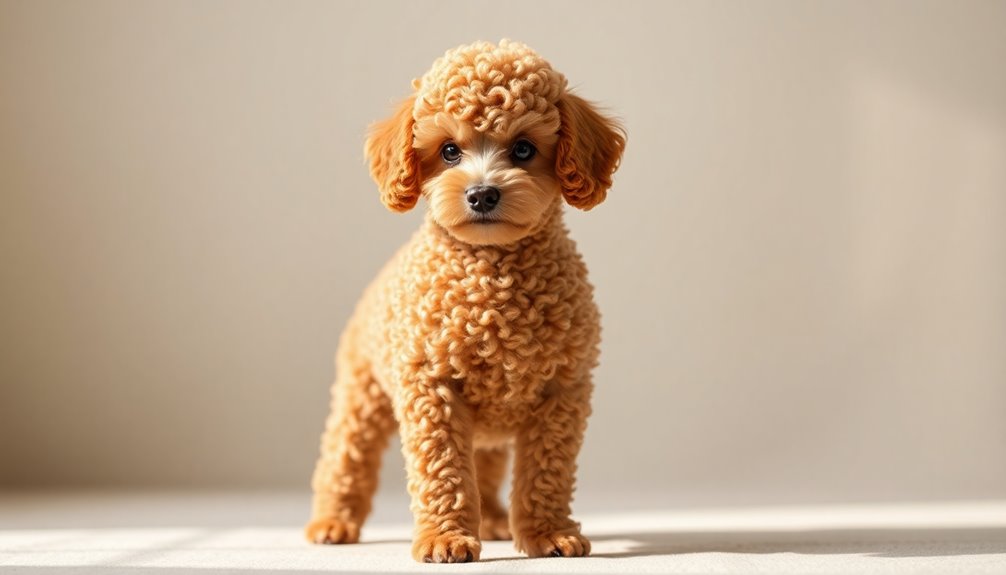
When you think about the Miniature Poodle, its size and weight stand out; they typically range from 10 to 15 inches tall and weigh between 10 to 15 pounds. Their curly, hypoallergenic coat not only adds to their charm but also requires regular grooming to keep it looking its best. With a well-proportioned body and elegant appearance, these dogs are truly a unique breed. Their hypoallergenic coats make them an ideal choice for families with allergies.
Size, weight, and coat details
Miniature Poodles typically stand between 10 to 15 inches tall at the shoulder, making them a compact breed that's easy to manage. In centimeters, that translates to about 28 to 38 cm. Their body length ranges from 15 to 19 inches (38 to 48 cm), giving them a well-proportioned appearance.
When it comes to weight, these Poodles weigh between 10 to 15 pounds, with males typically ranging from 8.8 to 13.2 lbs and females from 6.6 to 11.0 lbs. In kilograms, this is roughly 5 to 9 kg.
You can expect a Miniature Poodle to reach its full growth by around 13 months, with growth plates closing between 9 and 12 months. It's essential to monitor their growth, as factors like genetics and nutrition play a significant role in their development. Additionally, the size classification of Miniature Poodles as small dogs means they require supervision when outdoors to protect them from potential predators.
While intestinal parasites can stunt growth, recovery is usually quick once treated. Miniature Poodles feature a compact, square build with dark, oval-shaped eyes and folded ears close to their heads, contributing to their distinctive look.
With a lifespan of 12 to 16 years, they make delightful companions throughout their lives.
Curly, Hypoallergenic Coat Texture
The curly, dense coat of the Miniature Poodle is one of its most distinctive physical characteristics. These curls are tighter and more uniform compared to other breeds, giving the Poodle a stylish appearance. This unique coat not only looks great but also provides protection from water, making them excellent swimmers. Additionally, this coat type is the most recognized Poodle coat type, further enhancing the breed's appeal.
However, you'll need to commit to regular grooming to prevent matting and tangling.
One of the most appealing features of the Miniature Poodle's coat is its hypoallergenic nature. Unlike many dogs, Poodles have hair instead of fur, which means they shed minimally. The shed hair tends to get caught in the web of other curly hairs, reducing allergens in your home.
While they're not 100% allergen-free, proper coat care can significantly minimize allergens and maintain healthy skin.
To keep the curly coat in prime condition, brush it frequently and schedule regular trims. Professional grooming might be necessary, especially during the transition from the soft puppy coat to the adult curly coat, which usually fully develops by 12-18 months.
With the right care, your Miniature Poodle's coat will remain healthy, stylish, and comfortable.
Temperament and Personality
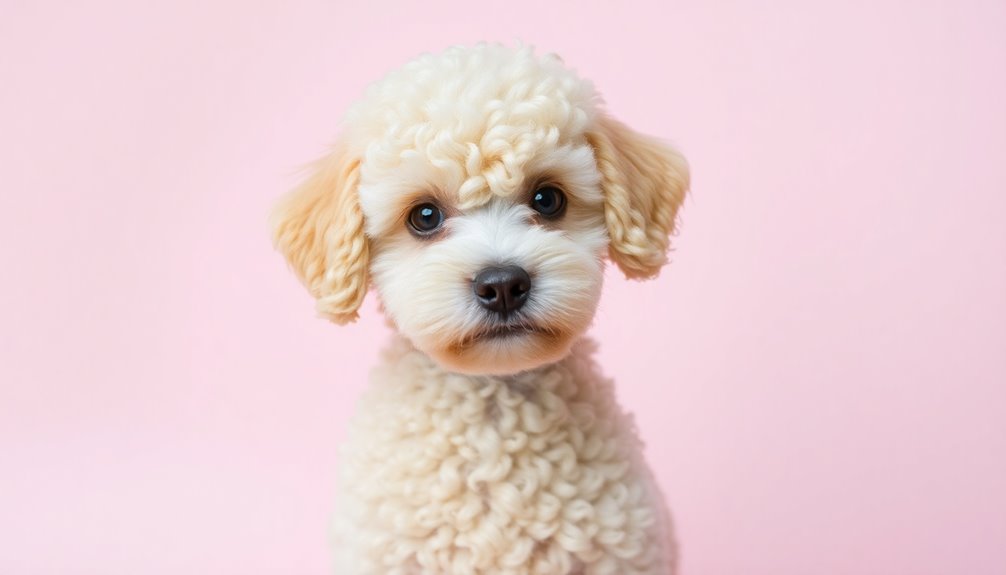
When you think of a Miniature Poodle, imagine a playful and intelligent companion that thrives in various environments, whether it's with families, individuals, or even other pets. Their lively nature and loving disposition make them fantastic additions to any household. However, you'll need to ensure they receive proper training and socialization to fully enjoy their potential. This breed is recognized for its intelligence and versatility, making it an excellent choice for families seeking an engaging and adaptable pet.
Playful and Intelligent Nature
Embodying a playful spirit, Miniature Poodles thrive on engaging activities that keep their minds and bodies stimulated. You'll find them eagerly chasing balls and retrieving them, always ready for a game of fetch or tug-of-war.
To keep your Miniature Poodle happy and healthy, regular exercise, including walks and playtime, is essential. Their clown-like antics around loved ones add to their playful nature, ensuring that every moment spent together is filled with joy.
These dogs are incredibly intelligent, mastering commands and tricks with ease. Their curiosity drives them to learn, making training sessions a breeze. Additionally, their high intelligence contributes to their quick learning of commands and problem-solving skills.
You'll be amazed at how quickly they pick up new skills, excelling in obedience, agility, and other canine sports. To keep their minds sharp, interactive toys and food puzzles are excellent choices, providing the mental stimulation they crave.
Though they've a confident demeanor, remember that gentle and consistent treatment helps prevent insecurities. Engaging in regular play and training fosters a balanced temperament, making your Miniature Poodle not just a companion, but a lively partner in all your adventures.
Suitability for families, individuals, or other pets
Miniature Poodles are an excellent choice for families, individuals, and multi-pet households alike, thanks to their adaptable and sociable nature. They generally get along well with children, especially if they're socialized early. Additionally, their high intelligence allows them to quickly learn commands, making training easier for families with children. This high level of emotional intelligence enables them to understand and respond to their owners' feelings effectively.
If you live in an apartment, their medium size and temperament make them a fantastic fit, but be cautious during rough play due to their fragility. Regular exercise and mental stimulation are essential to keep them engaged with your family.
For singles or the elderly, Miniature Poodles thrive on companionship. They adapt well to various living situations but may experience separation anxiety if left alone for too long.
Regular grooming is necessary to maintain their low-shedding coat, and consistent training helps with their energetic nature.
When it comes to other pets, Miniature Poodles can bond well with cats and dogs, provided they're introduced properly. They tend to be friendly and can live harmoniously with other animals if raised together.
However, take your time introducing new pets to ensure a smooth transition. With their playful spirit and loving disposition, Miniature Poodles can be a wonderful addition to any home.
Health and Lifespan
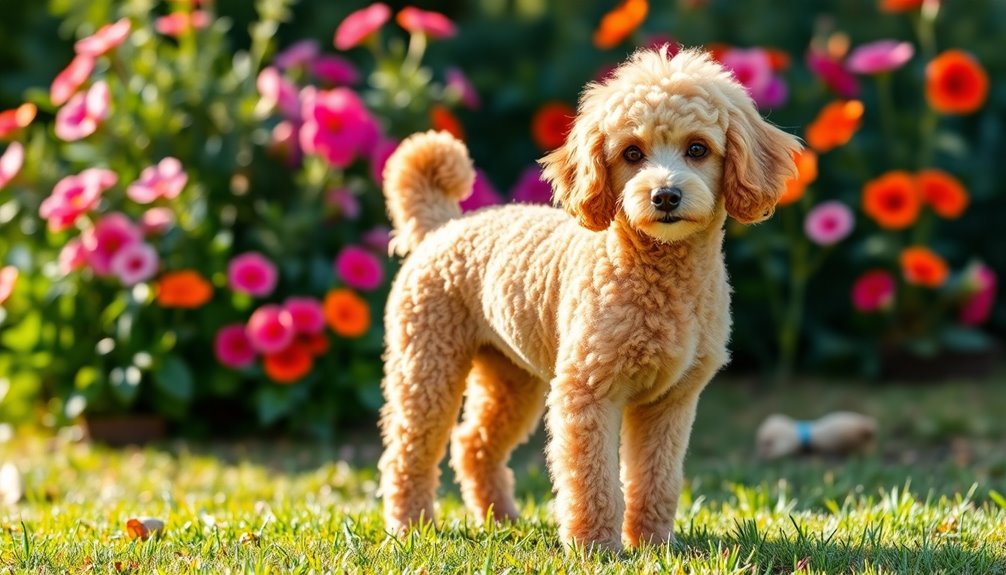
When it comes to your Miniature Poodle's health and lifespan, understanding common concerns is key. This breed typically lives around 15 years, but various factors can influence that number. Additionally, regular veterinary care can enhance longevity and help identify potential health issues early on.
Typical lifespan of the breed
The typical lifespan of a Miniature Poodle ranges from 12 to 15 years, with many reaching a median of 15 years. Some individuals even live longer, with optimal care extending their lifespan to 14-17 years.
Being a smaller breed, Miniature Poodles generally enjoy a longer life than larger dogs, which tend to age more quickly. This size factor is significant, as it influences their overall longevity. Miniature Poodles are known for their adaptability to living situations, which can contribute to a happy and stress-free life, ultimately supporting their lifespan.
Several factors can affect how long your Miniature Poodle will live. Genetics play a crucial role, so selecting a healthy pup from a reputable breeder is essential.
Regular exercise and mental stimulation are vital for maintaining their health and can contribute to a longer life. A balanced diet and routine veterinary care also significantly impact how long your furry friend stays by your side.
In exceptional cases, some Miniature Poodles have lived into their twenties, with one remarkable pup even reaching 28 years and 218 days!
Common health concerns or genetic predispositions
While many Miniature Poodles enjoy long, healthy lives, they can be prone to various health concerns and genetic predispositions that may impact their longevity.
One major issue is dental disease, affecting 80% of dogs by age two, with Miniature Poodles at greater risk. Tartar build-up can lead to gum infections and even impact vital organs like the kidneys and heart if not addressed. Regular teeth cleaning is essential to prevent this. Proper nutrition is also important to support overall dental health.
Metabolic disorders also pose risks, particularly diabetes mellitus and Cushing's Disease. Symptoms like increased thirst, urination, and weight loss require immediate attention and long-term management.
Additionally, skin and eye problems are common. Miniature Poodles may suffer from skin infections and eye conditions that can lead to blindness. Regular check-ups can help catch these issues early. It's also important to be aware that Miniature Poodles can be prone to inherited eye conditions which may require ongoing evaluations.
Lastly, they're more likely to develop bladder or kidney stones and face a higher risk of cancer as they age. Parasitic infections from fleas and ticks can further complicate their health.
Regular veterinary visits and awareness of these potential health concerns are crucial in ensuring your Miniature Poodle leads a happy, healthy life.
Tips for maintaining health and wellness
Maintaining your Miniature Poodle's health and wellness is key to ensuring a long, happy life. Start by providing a balanced diet rich in antioxidants, vitamins, and minerals tailored to their specific needs. Stick to high-quality food appropriate for their age and size, and avoid sharing human food to prevent obesity. Sweet feed can be high in sugar; moderation is key.
Daily exercise is crucial; aim for 45 minutes to an hour of physical activity. Incorporate walks, play sessions, and engaging activities like agility courses or puzzle toys to keep their minds sharp. Swimming is also an excellent option for exercise. Consider breaking up sessions into smaller chunks to keep them energized. Generally, smaller breeds tend to live longer, which is an added incentive to keep your Miniature Poodle active and healthy.
Proper grooming helps maintain your Poodle's coat and overall health. Brush their coat daily to prevent matting, and schedule haircuts every 4-6 weeks. Clean their ears weekly, brush their teeth at least three times a week, and trim their nails monthly.
Lastly, don't skip annual veterinary check-ups. Ensure vaccinations, parasite control, and dental care are part of their preventive health plan. Keeping track of their growth and addressing health issues promptly will help extend their lifespan and enhance their quality of life. [Regular teeth floating is crucial to prevent dental issues.
Care Requirements
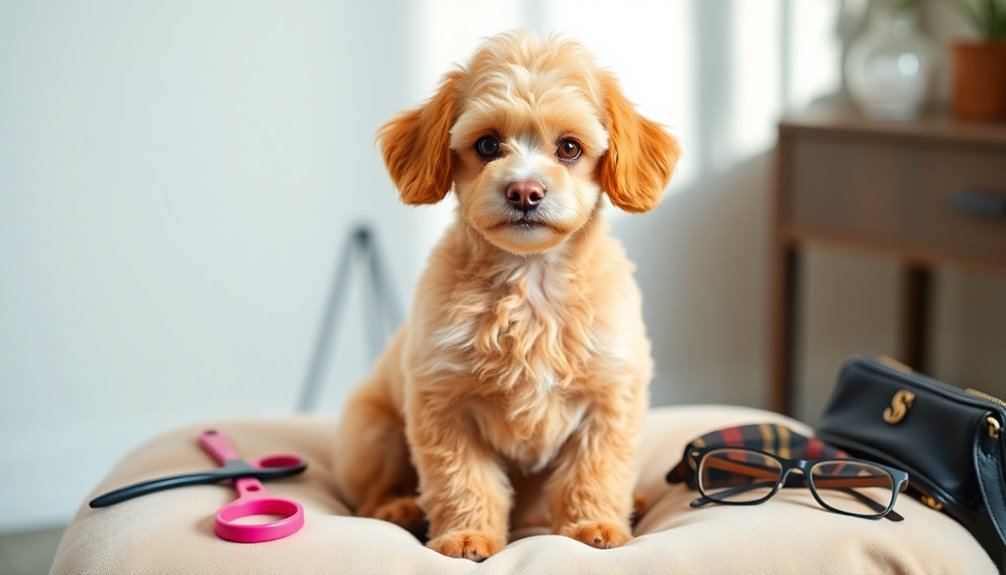
Caring for your Miniature Poodle involves regular trimming to keep their coat healthy and manageable. You'll also need to ensure they get plenty of exercise to match their energy levels, along with a balanced diet tailored to their needs. Additionally, it is important to provide daily dental care to prevent common dental issues that affect this breed.
Regular Trimming Required
Regular trimming is essential for keeping your Miniature Poodle's coat healthy and looking its best. To maintain the desired length and style, aim to trim your pup every 4-6 weeks. Professional grooming every 6-8 weeks can also help manage the coat effectively. Regular trimming prevents matting and tangles, especially in those beautiful curly locks.
Be sure to focus on areas prone to tangling, like behind the ears and under the legs. Trimming around the face, paws, and tail is crucial for cleanliness and comfort. Use slicker brushes and wide-toothed combs to gently remove tangles, and consider detangling sprays for added ease. You'll need specific grooming scissors and clippers for different areas, so invest in the right tools.
Daily brushing is a must, particularly in high-friction areas like the underarms and ears. Don't forget about regular ear cleaning to prevent infections. Additionally, nail trimming should be done about once a month. Regular grooming helps to promote skin health, ensuring your Miniature Poodle remains stylish and comfortable while also promoting their overall health.
Exercise requirements and energy levels
Exercise is crucial for keeping your Miniature Poodle happy and healthy. Aim for about 30 to 60 minutes of exercise each day, divided into 20- to 30-minute intervals. This can include brisk walks, playtime, or mental stimulation activities. Consistency is key to ensuring your Poodle stays physically fit and mentally engaged.
Miniature Poodles are energetic and athletic, so they thrive on a mix of activities. They enjoy brisk walks, jogging, and even swimming. Games like fetch, tug-of-war, and participation in dog sports such as agility and obedience are fantastic ways to channel their energy. Additionally, adult Poodles benefit from approximately 60 minutes of exercise daily to maintain their health and well-being.
Additionally, activities like hide-and-seek, food puzzles, and obstacle courses provide essential mental stimulation.
Keep in mind that your Poodle's exercise needs may change with age. Puppies require short, gentle sessions until they're fully developed, while adults can handle more intensive activities.
Senior Poodles may need less strenuous exercise but still require regular activity to maintain their health. Always adjust your dog's exercise routine based on their age and overall well-being to ensure they stay happy and engaged.
Feeding tips and diet recommendations
Feeding your Miniature Poodle a balanced diet is vital for their health and well-being. Start by ensuring they get high-quality proteins, which are essential for muscle development. Growing puppies need at least 22% of their daily food intake from proteins, while adults require around 18%. Lean sources like chicken, turkey, fish, and eggs are ideal.
Healthy fats are also crucial for skin and coat health, so include sources like fish oil and flaxseed oil. While Miniature Poodles need moderate carbohydrates for energy, opt for complex carbs such as oats, brown rice, and sweet potatoes, avoiding excessive simple carbohydrates to prevent weight gain. Proper nutrition supports overall well-being and longevity, helping to prevent common health issues.
A balanced mix of vitamins and minerals supports overall health. Incorporate vegetables and fruits like blueberries and broccoli for added nutrients.
Don't forget about hydration—ensure your Poodle has access to fresh water at all times.
Effective portion control is key to preventing obesity. Measure each meal based on guidelines and consider feeding puppies up to three meals a day, while adults thrive on two.
Create weekly meal plans using premium dog food tailored to their age, size, and activity level.
Training and Socialization
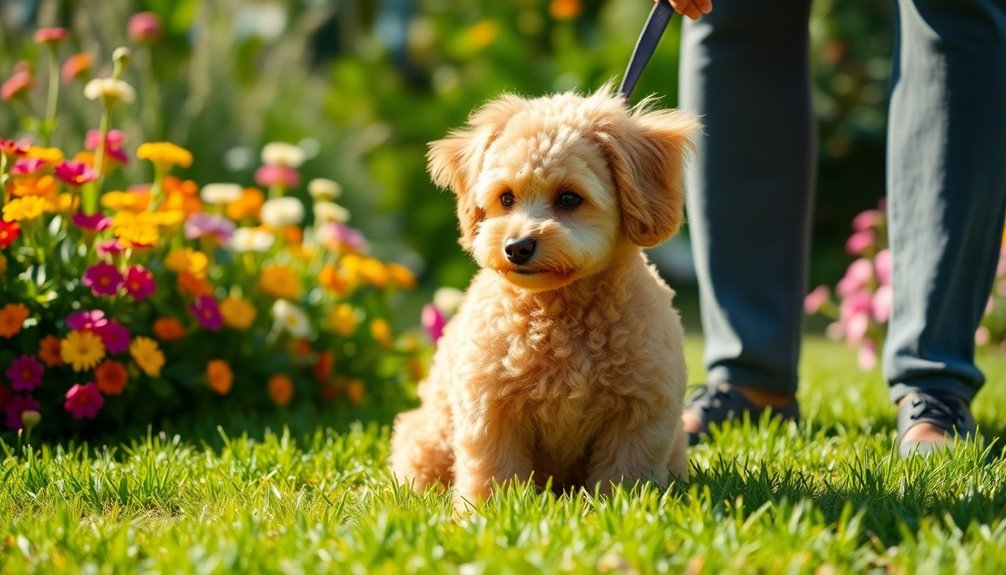
Training your Miniature Poodle can be a rewarding experience since they're highly trainable and eager to please. To ensure effective obedience, calm and focused training is essential, as it significantly influences their behavior and reputation. It's important to introduce them to diverse environments early on to build their confidence and adaptability. Keep in mind that Poodles can be prone to separation anxiety, so socialization is key to helping them feel secure.
Highly Trainable and Eager
With their remarkable intelligence and eagerness to please, Miniature Poodles stand out as one of the most trainable dog breeds. You'll find that they learn quickly and respond exceptionally well to positive reinforcement techniques. Using treats, praise, and playtime during training sessions helps motivate and reward them, making the learning process enjoyable for both of you.
Early training is crucial to establish good behaviors and manners. Keep training sessions short and engaging to maintain their interest and prevent boredom. Consistency is key—repeating commands and maintaining a routine will help your Miniature Poodle fully grasp what you want them to do. Regular vet check-ups are essential for monitoring their health, as early detection of health issues can significantly impact their training and behavior. Engaging in activities that promote mental stimulation can enhance their learning capabilities and overall development.
This breed thrives on mental stimulation, so incorporating various activities like food puzzles or teaching new tricks can keep their sharp minds engaged.
Positive reinforcement techniques not only encourage desired behaviors but also help build their confidence as they navigate new experiences. With your guidance, Miniature Poodles can excel in obedience training and advanced skills, proving that their eagerness to learn can lead to a well-mannered and accomplished companion.
Introduce to Diverse Environments
Introducing your Miniature Poodle to diverse environments is essential for building their confidence and social skills. Start socialization early, ideally between 3 to 14 weeks old, and aim to expose your puppy to at least seven different homes by 12 weeks. This helps them learn how to behave in various social settings.
Take your pup to parks, busy streets, and pet-friendly stores, and arrange playdates with other friendly, vaccinated dogs. Meet at least seven new people with your puppy, including individuals of varying ages and professions. Monitor their body language during interactions with other dogs to ensure positive experiences. Regular socialization with other dogs and people is crucial to prevent behavioral issues, as early socialization helps them adapt better.
You can also enroll in structured dog socialization classes for a controlled setting. Don't forget about exposure to new sounds! Gradually introduce your puppy to noises like blow dryers, car alarms, and babies crying. Use positive reinforcement to reassure them if they show fear.
Keep socialization sessions short and fun to maintain their interest, and be patient with adult poodles needing socialization. With consistent and controlled introductions, your Miniature Poodle will thrive in diverse environments, becoming a well-adjusted and sociable companion.
Separation Anxiety in Poodles
Separation anxiety is a common issue among Miniature Poodles, stemming from their high intelligence and affectionate nature. These dogs form strong bonds with you, making them more aware of your absence, which can lead to increased anxiety. Genetic predisposition may also play a role in their vulnerability to developing this disorder.
To help your Poodle cope, start with gradual desensitization. Leave your pup alone for short periods, then slowly increase the time apart. Create a safe space filled with toys and your scent to make them feel secure when you're gone.
Regular exercise and mental stimulation are crucial. Engage your Poodle with puzzle toys or interactive games to keep their mind active.
Counterconditioning can also help; associate your departures and returns with positive experiences, such as treats.
Make sure to desensitize them to departure cues, like picking up your keys, by practicing these actions without leaving.
For severe anxiety, consult your veterinarian about medications or seek help from a professional trainer.
Ideal Living Environment
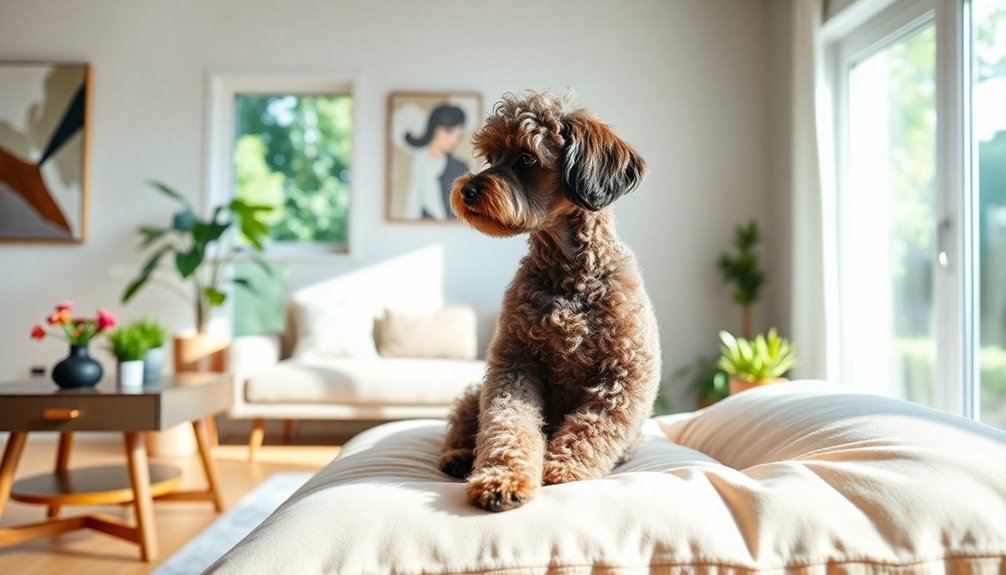
Miniature Poodles are perfect for urban living, fitting well into apartments without needing much space. As long as you provide them with regular outdoor exercise, they can thrive even in bustling city environments. Plus, they appreciate a moderate temperature, making them comfortable in various home settings. Their high intelligence allows them to adapt quickly to different living situations, making them excellent companions for city dwellers.
Urban Apartment With Space
Finding the right living environment for a Miniature Poodle in an urban apartment can make all the difference in their happiness and well-being. Since these small dogs measure just 11 to 15 inches and weigh between 10 to 15 pounds, they're well-suited for cozy spaces.
However, you'll need to ensure there's enough room for them to move, play, and rest comfortably. Keeping your apartment clutter-free is essential to avoid accidents and allow your Poodle to navigate easily.
Designate specific areas for sleeping and relaxation to create a sense of comfort and organization for your furry friend. Miniature Poodles are adaptable and can thrive in urban settings with the right provisions. In addition to their adaptability, their hypoallergenic coat makes them a great choice for those with allergies living in small spaces.
Regular daily walks and 45 minutes of playtime are necessary to keep their energy in check. Engage them with indoor games and obedience exercises to provide the mental stimulation they crave.
Being affectionate and sociable, your Poodle will appreciate quality time with you. Remember, managing noise sensitivity and encouraging community involvement can enhance their social experience, making your urban apartment a perfect home for your Miniature Poodle.
Moderate Temperature Comfort Zone
Creating a comfortable living environment for your Poodle means ensuring that the temperature remains within a moderate range. Poodles can tolerate cold weather thanks to their thick coats and body temperature of 101°F to 102.5°F, but extreme cold can still be dangerous, especially for puppies and seniors. It's important to be aware that cold medications can have potential side effects, which is crucial to consider if your Poodle has any health issues.
You'll want to watch for signs of shivering or lethargy, which indicate they might be getting too cold. To protect your Poodle during chilly days, provide a warm, cozy sleeping area and consider dressing them in jackets or sweaters if they've thinner coats. Additionally, maintaining a consistent exercise routine is essential to help them stay warm and healthy.
Limit outdoor time in frigid temperatures and ensure they take frequent breaks to warm up indoors. Booties or paw wax can help shield their paws from ice and snow, but be careful not to overdress them indoors, as that can lead to overheating.
Remember that younger Poodles lose heat faster than adults, and older Poodles may struggle to regulate their body temperature. Always monitor them closely during cold outings and maintain a balanced indoor environment to keep them comfortable year-round.
Protect their skin from sunburn in winter by limiting direct sunlight exposure as well.
World's Second Smartest Dog

When you think of the Miniature Poodle as the world's second smartest dog, you're not just looking at intelligence; you're also seeing a range of stunning color variations, including some rare shades. These vibrant colors add to their appeal, making them a favorite among dog lovers, including celebrities like Paris Hilton. Their intelligence and charm truly set them apart in the canine world. This exceptional problem-solving ability allows them to excel in various tasks and training challenges.
Color Variations Include Rare Shades
Miniature Poodles showcase an impressive array of color variations, including some rare shades that make them stand out even more. You'll find solid colors like black, blue, brown, and cream, but the newer shades, red and apricot, are particularly striking. These colors range from light to dark, influenced by genetics, and can change as the dog matures.
For instance, light reds might fade to apricot, while darker reds can lighten over time. True apricot Poodles often display black spots or liver points, adding to their unique appearance. Silver and blue Poodles are born black, transitioning to their distinctive hues as they age. The rare cafe au lait and silver beige colors are also recognized, though less common. Color appearance can change significantly from puppyhood to adulthood, illustrating the complexity of Poodle color genetics.
Interestingly, many Poodles experience color changes from puppyhood to adulthood, making grooming essential. With frequent grooming, you might notice your Poodle's coat color shifting, particularly in reds and apricots.
Paris Hilton's Beloved Companion
Paris Hilton's love for animals is well-known, but many might be surprised to learn that her pet collection doesn't include a Miniature Poodle, despite their reputation as the world's second smartest dog.
Instead, she's a variety of breeds, like Pomeranians and Chihuahuas, and even exotic pets like a miniature pig and a kinkajou. While her pets have made numerous public appearances, showcasing their charm and style, the Miniature Poodle remains conspicuously absent from her lineup. Notably, Hilton has adopted a range of pets, including six Chihuahuas, reflecting her unique taste in companion animals.
Miniature Poodles aren't just stylish; they're incredibly intelligent and trainable. Ranked second in intelligence among dog breeds, they can learn commands with fewer than five repetitions. Their ability to engage in dynamic communication exercises enhances the bond with their owners, making training a rewarding experience.
Their loyalty and loving temperament make them excellent companions for families and individuals alike. These dogs thrive on social interaction, needing ample attention and activity to stay happy.
With their hypoallergenic coat and impressive learning capacity—understanding up to 300 words—Miniature Poodles could have easily fit into Hilton's glamorous lifestyle.
Perhaps one day, we might see a Miniature Poodle by her side, flaunting their intelligence and flair in the spotlight.
Perfect for Active Lifestyles?
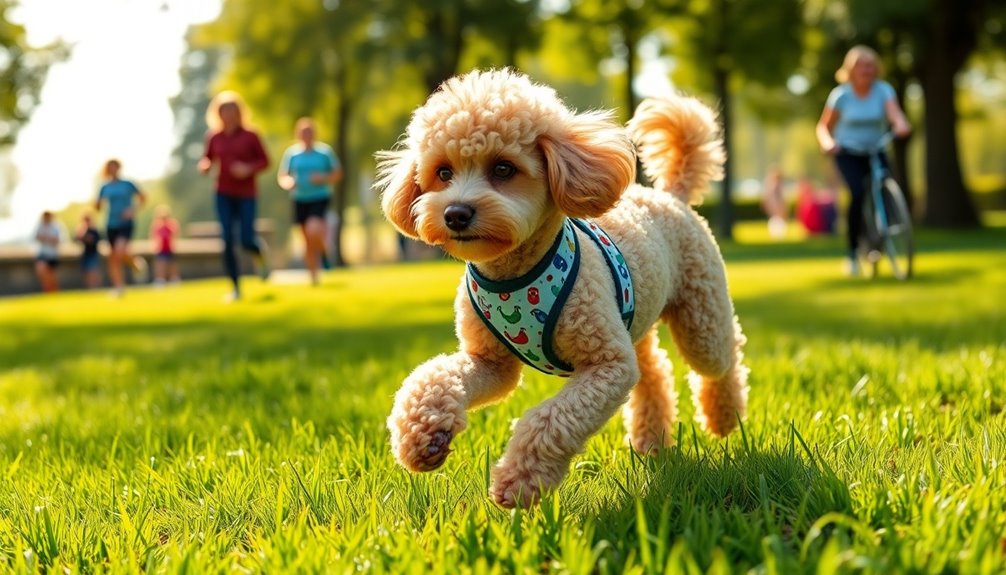
If you lead an active lifestyle, a Miniature Poodle can be the perfect companion for you and your family. They thrive on regular exercise and mental challenges, making them ideal for those who enjoy outdoor activities. Just keep in mind their grooming needs and the commitment required to keep them happy and healthy. Additionally, they are known for their high trainability, which allows them to quickly learn commands and tricks that can enhance your active lifestyle together. These dogs also benefit from positive reinforcement training techniques, which can further strengthen the bond between you and your pet.
Great for Active Families
For families that crave an active lifestyle, Miniature Poodles make an excellent companion. These energetic dogs require at least 1 to 1.5 hours of exercise daily, which you can break into manageable 20-30 minute intervals. They thrive on brisk walks, playtime, and mental challenges, so activities like fetch, jogging, and dog sports—such as agility and obedience—keep them engaged and happy.
Miniature Poodles adapt well to various living situations, including apartments, as long as they receive regular outdoor exercise and mental enrichment. They fit seamlessly into homes with children and other pets when properly socialized. Their small size makes it easy to take them along on errands or outings, ensuring they remain part of family activities. Additionally, their great adaptability allows them to thrive in different environments, making them a versatile choice for families.
Moreover, these dogs are highly intelligent and eager to please, making training enjoyable. They benefit from interactive toys and puzzle games that stimulate their minds. With consistent attention and engagement, you can prevent boredom and restlessness.
Grooming Needs and Commitment
When considering a Miniature Poodle, you'll need to commit to a grooming routine that matches their energetic lifestyle. These dogs require professional grooming every 4-6 weeks to keep their coats looking their best.
Ideally, you should brush their hair 3-4 times a week, but daily brushing is perfect for preventing matting and tangling, especially if their hair is longer. Regular grooming is crucial as it prevents mats and tangles, ensuring your Poodle's coat remains healthy and manageable.
Your grooming toolkit should include clippers, specific blades, shears, a brush, and a pin comb for detangling. Don't forget the dog-specific shampoo and conditioner for those baths every 4-6 weeks. Always brush them out before bathing to make the process smoother and more effective.
Nail trimming once a month is essential, along with regular ear cleaning to prevent infections.
You'll also need to pay attention to their eyes and teeth; clean the corners of their eyes gently and brush their teeth weekly with dog-friendly toothpaste. Scheduled dental cleanings as advised by your vet help maintain your Poodle's overall health.
With this commitment, you'll ensure your Miniature Poodle stays stylish and healthy, fitting perfectly into your active lifestyle.
Frequently Asked Questions
How Do Miniature Poodles Fare With Children and Other Pets?
Miniature Poodles generally fare well with children and other pets. They're friendly and playful, making them great companions for kids.
Just remember to supervise interactions, especially with younger children.
When it comes to other pets, early socialization is key; they typically get along well if introduced gradually.
What Grooming Tools Are Essential for Miniature Poodle Care?
For grooming your miniature poodle, you'll need essential tools to keep their coat healthy and stylish.
Invest in quality clippers designed for curly coats, sharp grooming scissors, and a variety of brushes. A two-sided steel comb is crucial for finishing touches.
Don't forget about ear and eye care supplies, nail clippers, and dog-specific shampoo.
Regular grooming practices, like brushing and trimming, will help maintain your poodle's beautiful coat and prevent matting.
Are Miniature Poodles Hypoallergenic?
Yes, miniature poodles are often considered hypoallergenic.
Their low-shedding, curly coat traps dander close to their skin, reducing allergens in your home.
However, it's important to note that no dog is completely hypoallergenic, and some people may still experience reactions.
Regular grooming and cleaning can help manage dander levels.
If you have allergies, spend time with a poodle before bringing one home to see how you react.
What Are Common Behavioral Issues in Miniature Poodles?
Common behavioral issues in Miniature Poodles include disobedience due to their independent streak, nipping in puppies, and jumping on people from excitement.
You might also notice growling, which needs addressing promptly. Lack of socialization can lead to anxiety, while boredom can result in destructive behaviors.
To manage these issues, establish clear rules and boundaries, provide regular exercise, and engage them with mental stimulation activities to keep their minds and bodies active.
How Can I Find a Reputable Miniature Poodle Breeder?
To find a reputable breeder, start by checking their affiliations with organizations like AKC or breed-specific clubs.
Visit their location to observe how the dogs are treated and ask about health clearances and genetic testing.
Inquire about the breeder's experience, socialization methods, and health history of the parents.
Look for transparency and positive reviews from previous buyers.
This way, you'll ensure you're making a responsible choice for your future puppy.
Conclusion
In conclusion, the miniature poodle is a fantastic choice for anyone seeking a smart, stylish companion. With their rich history, unique personality, and adaptability, they fit seamlessly into various lifestyles. Their intelligence makes training a breeze, and their playful nature keeps things fun. Whether you're active or just looking for a loving pet, this breed will undoubtedly enrich your life. Embrace the joy of having a miniature poodle by your side, and enjoy every moment together!





